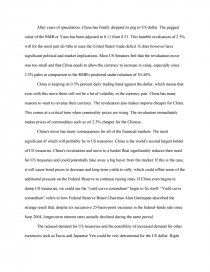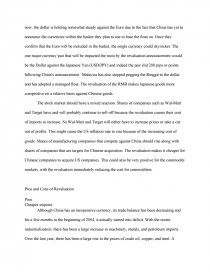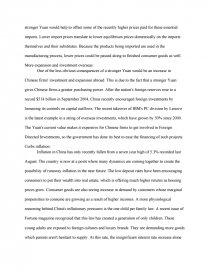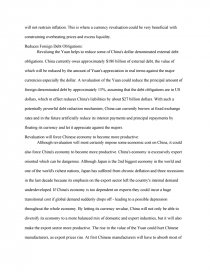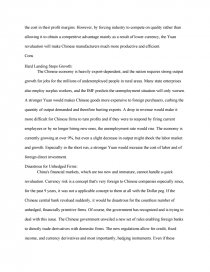Rmb Revaluation
Essay by review • December 10, 2010 • Essay • 1,837 Words (8 Pages) • 1,391 Views
After years of speculation, China has finally dropped its peg to US dollar. The pegged value of the RMB or Yuan has been adjusted to 8.11 from 8.31. This humble revaluation of 2.5% will for the most part do little to ease the United States' trade deficit. It does however have significant political and market implications. Most US Senators feel that the revaluation move was too small and that China needs to allow the currency to increase in value, especially since 2.5% pales in comparison to the RMB's predicted undervaluation of 30-40%.
China is keeping its 0.3% percent daily trading band against the dollar, which means that even with this move there will not be a lot of volatility in the currency pair. China has many reasons to want to revalue their currency. The revaluation also makes imports cheaper for China. This comes at a critical time when commodity prices are rising. The revaluation immediately makes prices of commodities such as oil 2.5% cheaper for the Chinese.
China's move has many consequences for all of the financial markets. The most significant of which will probably be in US treasuries. China is the world's second largest holder of US treasuries. China's revaluation and move to a basket float significantly reduces their need for US treasuries and could potentially take away a big buyer from the market. If this is the case, it will cause bond prices to decrease and long-term yields to rally, which could offset some of the additional pressure on the Federal Reserve to continue raising rates. If China even begins to dump US treasuries, we could see the "yield curve conundrum" begin to fix itself. "Yield curve conundrum" refers to how Federal Reserve Board Chairman Alan Greenspan described the strange result that, despite six successive 25-basis-point increases in the federal-funds rate since June 2004, longer-term interest rates actually declined during the same period.
The reduced demand for US treasuries and the possibility of increased demand for other currencies such as Euros and Japanese Yen could be very detrimental for the US dollar. Right now, the dollar is holding somewhat steady against the Euro due to the fact that China has yet to announce the currencies within the basket they plan to use to base the float on. Once they confirm that the Euro will be included in the basket, the single currency could skyrocket. The one major currency pair that will be impacted the most by the revaluation announcement would be the Dollar against the Japanese Yen (USD/JPY) and indeed the pair slid 200 pips or points following China's announcement. Malaysia has also stopped pegging the Ringgit to the dollar and has adopted a managed float. The revaluation of the RMB makes Japanese goods more competitive on a relative basis against Chinese goods.
The stock market should have a mixed reaction. Shares of companies such as Wal-Mart and Target have and will probably continue to sell-off because the revaluation causes their cost of imports to increase. So Wal-Mart and Target will either have to increase prices or take a cut out of profits. This might cause the US inflation rate to rise because of the increasing cost of goods. Shares of manufacturing companies that compete against China should rise along with shares of companies that are targets for Chinese acquisition. The revaluation makes it cheaper for Chinese companies to acquire US companies. This could also be very positive for the commodity markets, with the revaluation immediately reducing the cost for commodities.
Pros and Cons of Revaluation
Pros
Cheaper imports:
Although China has an inexpensive currency, its trade balance has been decreasing and for a few months in the beginning of 2004, it actually turned into deficit. With the recent industrialization, there has been a large increase in machinery, metals, and petroleum imports. Over the last year, there has been a large rise in the prices of crude oil, copper, and steel. A stronger Yuan would help to offset some of the recently higher prices paid for these essential imports. Lower import prices translate to lower equilibrium prices domestically on the imports themselves and their substitutes. Because the products being imported are used in the manufacturing process, lower prices could be passed along to finished consumer goods as well.
More expansion and investment overseas:
One of the less obvious consequences of a stronger Yuan would be an increase in Chinese firms' investment and expansion abroad. This is due to the fact that a stronger Yuan gives Chinese firms a greater purchasing power. After the nation's foreign reserves rose to a record $514 billion in September 2004, China recently encouraged foreign investments by loosening its controls on capital outflows. The recent takeover of IBM's PC division by Lenovo is the latest example in a string of overseas investments, which have grown by 50% since 2000. The Yuan's current value makes it expensive for Chinese firms to get involved in Foreign Directed Investments, so the government has done its best to ease the financing of such projects.
Curbs inflation:
Inflation in China has only recently fallen from a seven year high of 5.3% recorded last August. The country is now at a point where many dynamics are coming together to create the possibility of runaway inflation in the near future. The low deposit rates have been encouraging consumers to put their wealth into real estate, which is offering much higher returns as housing prices grow. Consumer goods are also seeing increase in demand by customers whose marginal propensities to consume are growing as a result of higher incomes. A more physiological reasoning behind China's inflationary pressures is the one child per family law. A recent issue of Fortune magazine recognized that this law has created a generation of only children. These young adults are exposed to foreign cultures and luxury brands. They are demanding more goods which parents aren't hesitant to supply. At this rate, the insignificant interest rate increase alone will not restrain inflation. This is where a currency revaluation could be very beneficial with constraining overheating prices and excess liquidity.
Reduces Foreign Debt Obligations:
Revaluing the Yuan helps to reduce some of China's dollar denominated external debt obligations. China currently owes approximately $180 billion of external debt, the value of which will be reduced by the amount of Yuan's appreciation in real terms against the major currencies especially the dollar. A revaluation of the Yuan could reduce the principal
...
...
